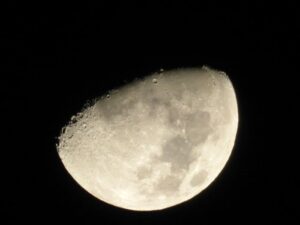By Dr Joanna Karamon
As luck would have it, with not just one but two editorials pending, I hit a writer’s block … a blank …
“Why don’t you write about what’s been on your mind lately?” pipes up a voice through the thick fog that has enveloped my mind … and immediately a word jumps out at me … AGEING.
I think it all started when the other half finally got me that long-yearned-for make-up mirror. Fantastic device, at just the right height for my vertically challenged frame, but man, did it really have to come with a magnifying function?
Suddenly those fine laugh-lines started taking on ravine-like proportions, the morning puffy eyes were looking really haggard, and we won’t talk about those crater-like pores …
Yep, it finally hit me, I was getting old…er.
Ageing is something we all have to look forward to in our journey through life; it was, however, something that I never really thought applied to me (don’t we all!). Suddenly, here I am, planning the big 40 party and, just as suddenly, looking good for my age is something that’s more and more on my mind. There’s that word again … AGEING.
With a surface area of about 16 to 22 square feet, our skin is far more than merely a protective barrier; it is in fact the body’s largest organ, and it serves to regulate excretion of metabolic waste products, regulates temperature, and includes receptors for pain, tactile sensation, and pressure.
Accordingly, the health and appearance of our skin, like the health of all our other organs, correlates with the lifestyle and dietary habits that we choose, as well as with other critical age-related factors such as hormonal imbalance.
Within the skin, ageing is associated with a loss of fibrous tissue (namely collagen and elastin) and subcutaneous fat, slower rate of cellular renewal, and a reduced vascular and glandular network, which makes the skin appear flatter, thinner and more saggy.
Its barrier function which maintains cellular hydration will also become impaired, further contributing to that sallow, aged look.
Depending upon one’s genetic makeup and lifestyle, normal physiological functions within the skin may decline by more than 50% by middle age … and, in fact, starts to decline soon after puberty! Not exactly good odds for staying fresh-faced, is it? Research shows that there are, in fact, two distinct types of ageing:
1. Intrinsic ageing, which is caused by our own genetic makeup and hormonal influences. With ageing, there is a decline in the level of sex hormones (oestrogen, testosterone, dehydroepiandrosterone sulfate) and growth hormones, all of which have great influence on the skin.
2. Extrinsic ageing is caused by environmental factors, such as UV exposure and exposure to harsh climates (especially extreme cold and environmental pollution), smoking, alcohol use and abuse, stress and sleep deprivation (so, I guess what they say IS true, you only look as good as you feel).
Our skin is the most ‘visual’ of organs, and whether we like is or not , can play a pivotal role in our social engagements and interactions, so no wonder that looking good, or just our best, can have serious psychological repercussions on each individual. And often those aspects need to be addressed just as much as the wrinkles, acne or surgical scars you are trying to treat.
My brother-in-law once asked me, almost 10 years ago, why don’t I go into anti-ageing or aesthetic medicine. And 10 years ago, in the folly of my youth, I scoffed at such a frivolous speciality. But now, as I become slightly more concerned about my own ageing process, I recognise his rather visionary advice, and the more I research and study and delve into this area of medicine, the more I see what a complex field it actually is.
Aesthetic Medicine is not yet recognised as a fully-fledged medical speciality in a majority of countries, but this is slowly changing.
What was once the absolute reign of plastic surgeons and specialist dermatologists has evolved into a multidisciplinary field, where many factors have to be taken into account and treated to achieve the optimum results. And as the quest for youth and beauty continues to evolve, research advancements within the cosmetic and medical aesthetics industry have seen exponential growth over the last 20 years.
Within corrective dermatology and aesthetic medicine, the most sought-after treatments include those with the least amount of down time and minimal risk, and should always include a discussion on eating and lifestyle habits which will help reduce the impact of the extrinsic effects on skin ageing. These include:
1. Injectables such as botulinum toxin preparations, and hialuronic acid-based fillers, which stop the actual formation of fine lines and wrinkle due to repetitive ‘bending’ of the skin surface
2. Chemical peels and dermabrasion procedures, which literally scour the top layer of the skin off and then allow for a ‘resurfacing’ of the skin through the natural healing process
3. Lasers, intense pulsed light and radiofrequency treatments, which again help stimulate the underlying collagen matrix network to tighten up and ‘resurface’ the top layer through microtrauma.
4. Stem cell technology, such as platelet rich plasma which can be injected into the skin or introduced into the skin with mesotherapy appliances.
5. Mesotherapy/microneedling procedures, such as dermaroller and the newer, more effective DermaPen device, which cause microtrauma to the dermal layer thus stimulating the natural healing process, which, in turn, causes increased collagen and elastin production, making the skin look tighter, more plump and rejuvenated.
So here I am, looking again at those ‘laugh lines’ under my wonderful magnifying mirror and thinking that word again … AGEING. Those lines may very well be the road maps of my soul but as any well travelled road would say … a bit of resurfacing has never hurt the traffic across it.
|| features@algarveresident.com
Dr Joanna Karamon is GP/Aesthetic Medicine Practitioner.
Assistant Medical Director at Luzdoc IMS



















